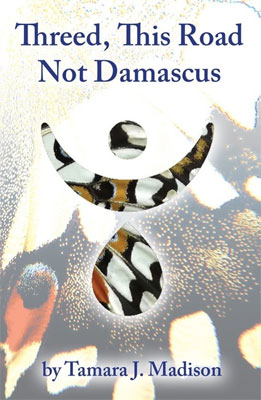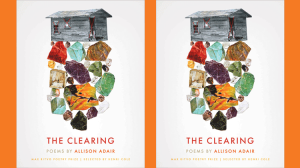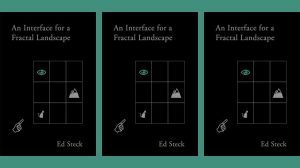Threed: This Road Not Damascus by Tamara J. Madison / Trio House Press / 2019
 In Threed: This Road Not Damascus, Tamara Madison’s first full-length collection of poetry, this poet and performer dances between mythical and tactile worlds. Through intimate conversations with ancestors, the Bible, and her own self as a poet and mother, she is not subtle in her message. In the first poem “Wombing: Three-Breasted Woman Shares Her Birth Story” Madison writes “I did not come here just to fight. I came/ to love you.”
In Threed: This Road Not Damascus, Tamara Madison’s first full-length collection of poetry, this poet and performer dances between mythical and tactile worlds. Through intimate conversations with ancestors, the Bible, and her own self as a poet and mother, she is not subtle in her message. In the first poem “Wombing: Three-Breasted Woman Shares Her Birth Story” Madison writes “I did not come here just to fight. I came/ to love you.”
The word “threed” is defined by Madison as “a being carrying three breasts (or another appendage) where normally there are two.” This prophetic figure, the three-breasted woman, acts as a muse and a guide throughout the book. In the powerful poem, “Restraint: Three-Breasted Woman on the Auction Block” she asks “Would it comfort, confound,/ frighten them more/ to know once upon a time/ we all were threed?”
Madison’s collection is broken down into three distinct sections. Throughout the book, she traverses the rough terrain of race, slavery, gender, identity, and motherhood with daring exuberance. Inventive syntax and poignant alliteration invite the reader to experience each poem, feel each line deep within the body. In “Poet’s Arrival” she writes, “Thrust from ragged wombs,/nursed on battered breasts,/whispered from my mothers’ severed tongues, / here I come.” This arrival, she shows us, is no accident, but a potentially predetermined event rooted in matriarchal lineage and unwavering faith.
A fierce mother herself, Madison writes in the poem “Covenant” which appears in the second section, “I will melt stars,/hammer for hours your shield.” However, in another poem that appears in section three, “Poet’s Transcendence,” she confesses, “I lie in the crook/ of your elbow/ safe, brave, enough/ to become smaller than small.”
To feel as if one is enough is not easy, and Madison’s journey of self-acceptance and renewal throughout these poems is contagious. So, too, is her anger and her joy. While reading Threed: This Road Not Damascus I found myself considering my own continuum, those that came before and those that came after, and felt moved to understand my own history more fully. I am grateful that Madison shares these sacred exchanges with her readers, allowing us to see how the world has been and what the world could be.




Leave a Reply